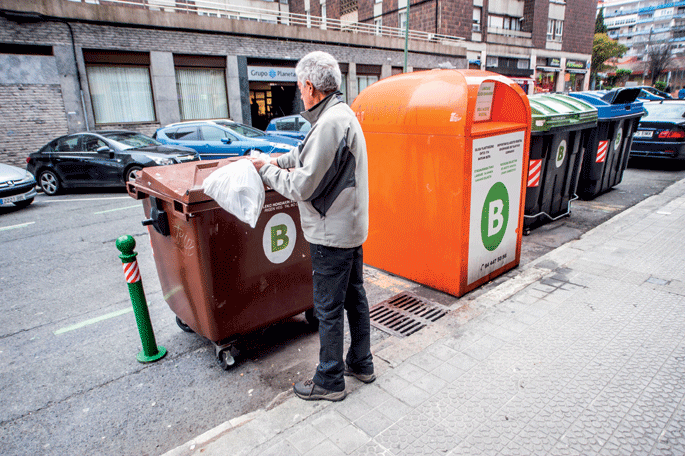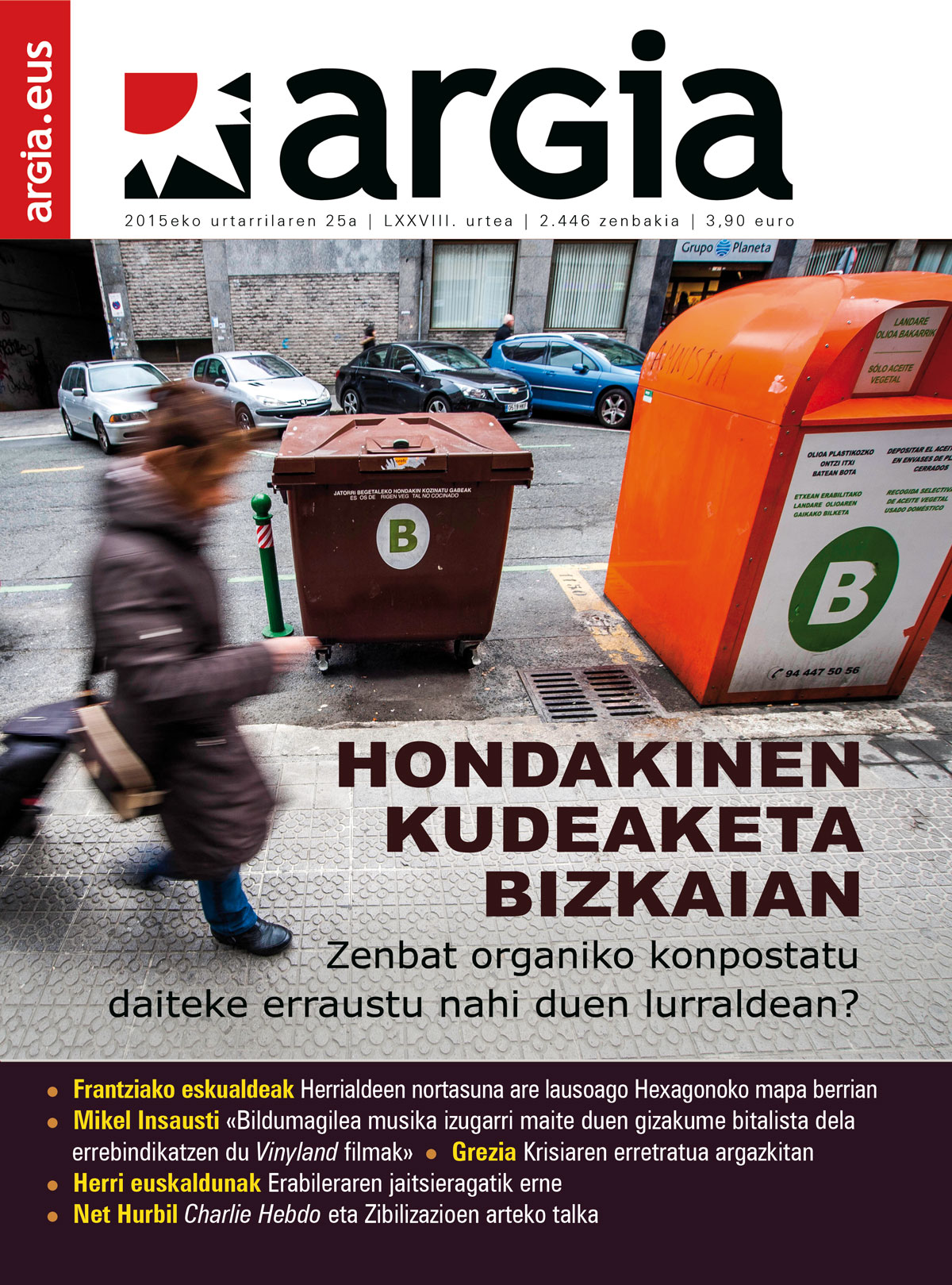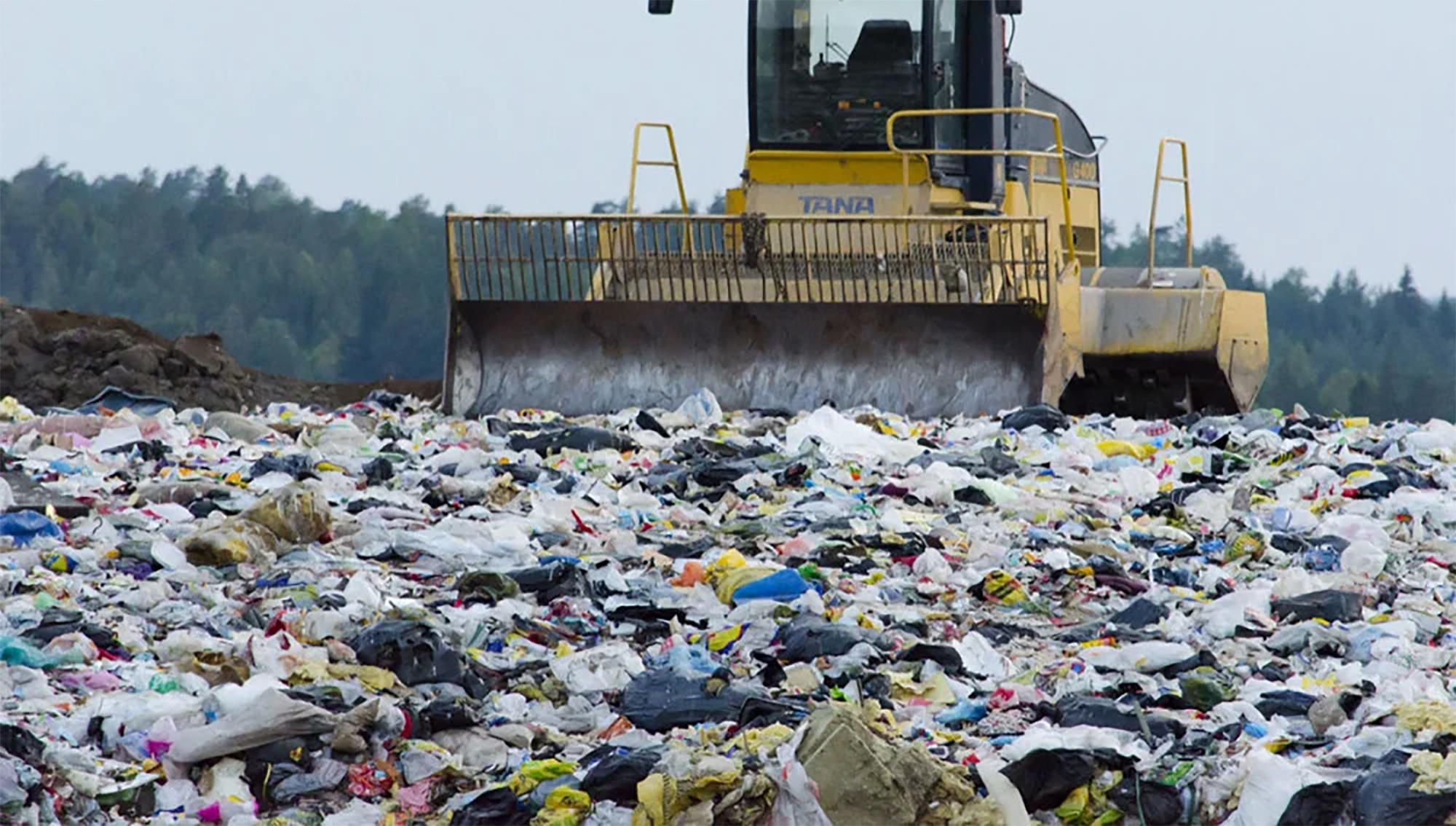How many organics can they compress in the territory that they want to incinerate?
- The Provincial Council of Bizkaia has asked the municipalities to intensify the selective collection of organic matter. Data for 2013 are far from the targets set by the country’s waste management plans. In the opinion of the opposition (and on waste, to say opposition i.e. EH Bildu), the data are the result of the fact that waste management in Bizkaia is focused on the incinerator Zabalgarbi. For the time being, most Biscayan people do not have a fifth container in their village.

The Provincial Council of Bizkaia will have to do important work if it is to meet the target set for 2016 for organic waste collection, although critical voices point out that it is not an ambitious target. In a letter sent to the municipalities of the territory in November of last year, the Council recalled that the II Urban Waste Management Plan will expire in 2016. The Comprehensive Plan provides for the selective collection of 24,000 tonnes of organic waste per year. It accounts for 4% of the total urban waste generated by the Biscayan people.
In the same letter you can read that in 2013, the year in which organic containers were first installed, only 4,900 tons were received. “Much remains to be done” is the message that we have conveyed from the Gran Vía de Bilbao to the municipalities.
The measures proposed to deal with the problem are a couple of passages beyond: The Deputy will subsidise in 2015 both the purchase of self-composting and the placement of the fifth container if they do not yet have it. In fact, only in the centre of the municipalities of Bizkaia is there a container for the separate collection of organic matter, and the average amount of waste collected in them is very low, according to data provided by the environmental protection association Zero Zabor: 0.35 kilograms per person per month, far from the 7-8 kilograms each of us generates.
A necessary nuance: among the municipalities that deposit all the organic waste in the “ordinary”, “eternal” container – rejection is not a very widespread concept in Bizkaia – some are quite large, but in all of them Bilbao stands out, no doubt. The first brown containers of Bizkaia were installed in the bilbaíno district of Deusto, as a pilot project in 2012, and still remain there as pilot projects and without extending to the rest of the neighborhoods of the city. This, of course, determines the rates of collection across the country. It should not be forgotten that about 30% of Biscay and Biscay live in the Biscay capital.
Eh Bildu: “The goal is very modest”
“It is the last months of the legislature and the PNV has realised that if they continue to do so they will not reach the 4% target. We first realized,” says Asier Vega, EH Bildu’s juntero in Bizkaia. At the beginning of the legislature the II Urban Waste Management Plan The revision of the EU Comprehensive Plan was the most controversial one, according to Vega. “We said we did not see any sense to the review because, as we did not see the plan itself, it is based on Zabalgarbi. They started building the house on the roof and now you have to feed the fiera. Zabalgarbi conditions the integrated management of waste in Bizkaia”.
The biggest problem is the collection of organic waste, which is by far the thickest fraction of urban waste. According to Asier Vega, around 42% of the total, the percentage provided for in the Management Plan for 2016 is lower, but high in all cases: 37%.
Thus, according to EH Bildu Juntero, the target of collecting 24,000 tonnes of organic waste annually is very low – the Council estimates that at least 200,000 tonnes will be generated in Bizkaia in 2016. “A good collection of organic in Bilbao and taking it to composting would be enough to far exceed this goal.” The Abertzale coalition considers that the Member of Parliament has no desire to compose, so that there are few facilities for the collection of waste.
At a press conference in October, EH Bildu denounced the same thing as the Council in a letter to the municipalities: that Bizkaia is far from its goal. And he made a number of proposals to increase the collection rate.
On the one hand, allow prepared food, as it has been so far, to be deposited in the fifth container; the Council announced the same day that it will do so (see table on the next page). We don't know whether or not we obey EH Bildu's request.
The second demand was to expand the fifth container to larger localities and promote its use. Thirdly, Asier Vega called for the support and encouragement of pilot experiments in order to increase the collection of organic in Bizkaia and to take as a model those already under way. Vega cited examples of Larrabetzu, Mallabia and Berriz. In fact, yesterday's hearing was accompanied by the mayors of the first two and by a councillor of the third.
Model by Larrabetzu
One of the most interesting pilot experiences is the one started in autumn 2013 in Larrabetzu. As explained to us by Mayor Asun Gaztelu and Councilor Isabel Etxebarria, the initiative was not born with the aim of improving the use of waste, but of promoting agriculture, but in the end they have realised that it serves a dual purpose.
In short, they have organized a system for composting and use of organic produced in the city. The citizens who sign up are given a cube, and they leave it in front of the doors in days and hours, three times a week. Then, the baserritars come to collect the organic, take it to their homes and there they compost, in the composting created in auzolan by the association Gurorder, promoter of the project.
Until recently there was only one farmer in this work, but a second was added to it over the year. The City Council undertakes to pay both of them a salary in exchange for the collection of the waste.
This collection system is carried out only in the centre of the town. “There are about 400 homes, at the moment 105 participate in the experience, but we will reach 175. We have a waiting list because the capacity of composting is limited,” explains Gaztelu and Etxebarria. It is said that in the municipality there are very few people who use the fifth container, but in the Txorierri community they have the highest percentage of organic matter collection, by far.
Txorierri has about 20,000 inhabitants. “You could do something like ours for the entire valley and keep the compost here,” says Isabel Etxebarria, “but you have a contract with the composting of Artigas and send it to him.” Artigas (Bilbao) is the only composting in the whole of Bizkaia, located on the mountain of the same name, in the “neighborhood” called Ekoparkea. Next to the composting plant are the landfill recently owned by Bilbao and which has recently been handed over to the Provincial Government, the incinerator Zabalgarbi and the TMB, the plant for the biological mechanical treatment of waste.
“Waste is resources and we throw it away”
Artigas composting is small, too small. At least this is what Txelio Alcántara, a member of Ekologistak Martxan, believes. It shares the view of Asun Gaztelu and Isabel Etxebarria de Larrabetzu and Asier Vega that the existence of a single compost in Bizkaia makes no sense. In his view, it is further proof that the management of organic waste is being carried out in a very clumsy manner.
“Considerable progress is being made in some aspects of selective collection in Bizkaia, but as far as organic collection is concerned, the authorities are acting with cowardice. Pilot experiments are still being carried out with the fifth container, as it has long been known how to manage organic correctly.”
For Alcántara, every waste is a resource, “and we discard it.” As long as we are not clear that waste is a good thing, we will have a problem, in your words. “We think that all or almost all waste can be recovered if properly treated and, once recovered, provide value. In fact, we have said on one occasion that waste management can be free of charge, because by closing the circle all the costs are covered. But the institutions do not understand it and invest in infrastructures that do not generate value, such as incineration”. Alcántara considers it a tremendous error to burn the matter that could be reused.
Compost is an example of this. “The Representative usually says that the compost has no market, but that’s not the case.” Ekologistak Martxan has carried out campaigns on behalf and on behalf of the Council to promote the fifth container, “we distributed the compost they had given us and we were exhausted”. Among other things, Alcántara has announced that it will take a lot of compost to recover the mountains that are losing fertile soil due to the poor management of the mountain.
Little remains for 2016, and on the right track it will soon be known whether organic matter collection has improved. The Member has informed us that in March the figures for urban waste management in 2014 will be made known. Let's hope they're better than Sopela. In the coastal village of Uribe Kosta, the use of the fifth container is being given special attention. According to reports in November, the fifth container has not served them to improve the overall data for selective collection: From 16.48% in 2012 to 16.85% in 2013. One of the lowest percentages in Bizkaia. Nor is it surprising that in the bags where only organic matter was available, bottles, carpets, packaging, plastic, etc. appeared recently. Obviously, the composting of Artigas did not accept the residues of the sopeloztarras. But they have not gone far: they have been engulfed by Zabalgarbi, who is by his side.
Azaroan bidalitako gutunean, Bizkaiko Foru Aldundiak udalei jakinarazi zien aurrerantzean prestatutako janaria ere jaso ahal izango zela bosgarren edukiontzian. Hasiera batean, jatorri begetaleko hondakin gordinak, kozinatu gabeak, besterik ez ziren onartzen edukiontzi marroian; izan ere hala da oraingoz, eta hala izango da udal eta mankomunitateek Aldundiaren gomendioa praktikara eramateko planak garatu bitartean.
Prestatutako janaria ontzira botatzea eragozteko, modu horretan konpostaren kalitatea asko gutxitzen dela argudiatu zuen Bizkaiko Ingurumen sailak. Iaz Basaurin egindako esperientzia pilotuaren arabera, ordea, kozinatutako hondakin organiko kantitate oso-oso txikia biltzen da, eta konposta egiteko prozesuan ia ez da igartzen. Horregatik erabaki dute onartzea.
Hain zuzen, prestatutako janaria gainerako hondakin organikoarekin batera jaso ahal izatea izan zen EH Bilduk Aldundiari egindako eskarietako bat, bilketa kopuruak hobetze aldera. Baina Basauriko esperientziaren emaitza ikusita –“kozinatutako hondakin organiko kantitatea oso-oso txikia da”–, espero daiteke neurriak eragin handirik izatea?
Ingurumen Sailak zabaldutako informazioa ez du zehazten zenbat den “oso-oso txikia”, baina Hiri Hondakinen Kudeaketarako II. Plan Integralak 2016rako egiten dituen aurreikuspenetan, kozinatutakoa organiko guztiaren %18,5 da. Eta besterik gabe basauritarrek erabaki badute prestatutako janaria kubo marroira ez beste edonora botatzea?
Salbuespenak salbuespen –berbarako, erreportaje honetan aipatu dugun Larrabetzuko organiko bilketa edo berriki Ondarroan martxan jarritakoa, biak ala biak borondatezkoak–, atez atekoaren arrastorik ez dago Bizkaian. EH Bilduk udal askotan agintea izan arren eztabaida hori hain gutxi zabaldu izanaz galdetu diogu Asier Vegari. Hona erantzuna:
“Gipuzkoa eta Bizkaia soziologikoki desberdinak dira, eta bestalde, eztabaida Gipuzkoara iritsi zenerako sistema martxan zegoen herri batzuetan, eta jendeak ezagutzen zuen. Bizkaian, aldiz, ez dago inon, eta eztabaida guztiz kakaztuta iritsi da hona. Gauzak beste era batera egin behar dira edo elkarri mokoka eta irtenbiderik gabe jarraituko dugu. Guk nahiago dugu hausnartzea zein herritan den posible atez atekoa, zintzilikarioekin edo beste sistema batekin. Gakoa da jendeari esatea derrigortasuna ez dela txarra. Agian hobe da pausoak gutxika ematea, helburua zein den ahaztu gabe, eta eraginkorragoak izatea. Hori bai, guk argi daukagu bosgarren edukiontziaren sistema ez dela hain eraginkorra”.
Barakaldoko Brutzeña auzoan hondakinekin lan egiten duen Contenedores Vascos baten aurkako salaketa jarri du Ekologistak Martxan elkarteak.
Edukiontzi marroia, materia organikoa jasotzekoa, udalerri osora hedatuko duela iragarri du Bilboko Udalak. Hainbat auzotan dauden ontzi zaharrak ordezkatu eta orain arte jarri ez den lekuetan berriak jarriko ditu; 1.500 edukiontzi berri guztira. Aurrerapauso pozgarria... [+]
























